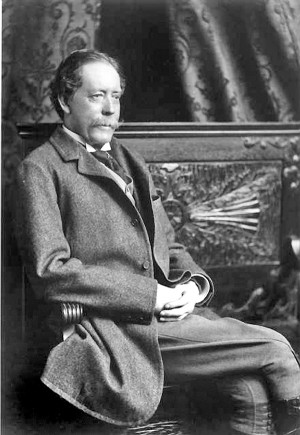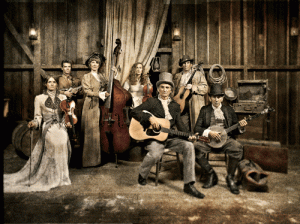By Doug Schmidt
There are many differences between the culture of today and the culture that existed in the early days of the Colorado pioneers. One of the most glaring is that anyone attempting a new venture in the 21st century is given a list of reasons outlining why the project cannot be completed as proposed. The early railroad pioneers did not tolerate being told why not, but expected to be told how the project would be completed.
One such man who racked up accomplishment after undaunted accomplishment was General William Jackson Palmer, founder of the Denver and Rio Grande Railroad and the driving force behind the establishment of Colorado Springs as a major American city.
 As with William Byers of Rocky Mountain News fame, William Jackson Palmer had lived a full and exciting life long before he arrived to put his stamp on Colorado. Born in Leipsic, Delaware on September 17, 1836 to Quaker parents, Palmer moved with his family to Germantown, Pennsylvania. This move exposed him to the locomotives of the Pennsylvania Railroad, and young William’s curiosity concerning these wood- burning workhorses was endless. He strived to learn all he could about this new mechanical wonder.
As with William Byers of Rocky Mountain News fame, William Jackson Palmer had lived a full and exciting life long before he arrived to put his stamp on Colorado. Born in Leipsic, Delaware on September 17, 1836 to Quaker parents, Palmer moved with his family to Germantown, Pennsylvania. This move exposed him to the locomotives of the Pennsylvania Railroad, and young William’s curiosity concerning these wood- burning workhorses was endless. He strived to learn all he could about this new mechanical wonder.
At age 17, Palmer managed to get hired by a railroad building company near his home as a surveyor’s assistant. His gift for the work was soon evident and he was sent by the company to go abroad for study, attending classes in England and France.
Returning to his home at age 20, Palmer found work with the Pennsylvania Railroad.
Once again he caught the eye of management and became the personal secretary to the PRR president John Edgar Thompson. This proved to be his true education in both the true inner workings of a major railroad and the ins and outs of managing a large corporation. These lessons would come in handy later in his life.
Palmer addressed PRR’s problem of fuel consumption in what would become an earthshaking action. The Pennsylvania Railroad was rapidly burning up all the wood along their rights-of-way as they sent more and more locomotives over their newly laid rails. Young Mr. Palmer convinced his boss that burning coal was the way to go, and the Pennsy was the first U.S. railroad to convert to coal burning locomotives. Over the next four years Palmer’s main concerns on the railroad were increasing power and combustion. Associations made at this time are worth noting. His collaborators included a PRR vice president, Thomas A. Scott, and Scott’s assistant, a young Scottish immigrant named Andrew Carnegie, who would come to make his own mark upon the world in later years.
[InContentAdTwo]
Palmer’s promising career was to be interrupted by the outbreak of the Civil War. Although Palmer’s upbringing had taught him to abhor violence of any kind, the need to free enslaved people caused him to enlist in the Union Army. Again showing his leadership qualities, William formed a brigade of mostly railroad associates (15th Pennsylvania Volunteer Cavalry) who fought impressively and effectively. An expert scout, Palmer then became a spy for General George McClellan.
In 1862 he was behind Confederate lines gathering intelligence for the Union Army and was detained by the Rebel troops. A man his age in civilian clothing aroused suspicion and he was held for questioning and later transferred to the notorious Castle Thunder Prison in Richmond, Virginia. He was eventually set free in a prisoner exchange and rejoined the fighting, pursuing General Hood of the Confederate Army across the South.
His actions in the war earned him the Congressional Medal of Honor and he retired as a brevet Brigadier General. He was 29 years old.
So what does a man do to follow such a list of accomplishments before the age of thirty? In the case of men like William Jackson Palmer, you head for the West to seek your fortune. Two years after the end of the war, Palmer and his chief assistant, 21-year-old Edward Johnson, were headed west. Palmer had been named construction manager for the Kansas Pacific and his charge was to map routes through New Mexico and Arizona to establish a route to California.
At this time the Kansas Pacific was a venture capitalized by the Pennsylvania Railroad. Palmer led the expansion of the KP from Kansas City, Missouri to Denver in 1870. Palmer’s survey work had led him from New Mexico north to Denver and he was convinced that a Pueblo-to-Denver route would become highly profitable and relatively easy to build.
Presenting his “West to Pueblo to Denver” idea fell on deaf ears. Any route that was not directly east-west was not considered to be prudent. Palmer was so convinced that his route would prove to be profitable, he started his own railroad with and laid track from Denver to the Pikes Peak area. He called his new pike The Denver and Rio Grande Railroad.
General Palmer was joined in this venture by his lifelong friend Dr. William Bell. They met while Palmer was with the Kansas Pacific. Bell, originally from England, became Palmer’s most trusted associate; in every company that listed William Palmer as its president, almost invariably was Dr. Bell listed as a vice president.
The year 1870 proved to be a pivotal year for the General in a number of ways
Not only did he start his railroad, but he also married Mary Lincoln Mellen. Mary was known throughout her life as “Queen.” On his honeymoon in the British Isles, he saw, for the first time, narrow gauge railroads at work. The proverbial light came on immediately as Palmer realized that laying narrow gauge track would not only move along faster and be easier to build in mountain terrains, but would also be less costly on several fronts. Imagine being in a hurry to end your honeymoon.
The race to Mexico was on! Palmer’s route would run over Raton Pass and head south for Mexico. The Atchison, Topeka and Santa Fe also had the same idea and the rivalry turned bitter and confrontive almost at once. Men who were good with a gun and many local and state politicians made a lot of fast money by working for either side of the conflict.
In the final resolution, known as the Treaty of Boston, the AT&SF won the right to trackage over Raton, and the D&RG was allowed to lay track unimpeded through the Royal Gorge canyon of the Arkansas River, thereby gaining rights to head west toward the mines. The need to lay track over the wide variety of terrain was the advantage of narrow gauge. Starting west out of Pueblo, the D&RG reached Salida in 1880 and headed to Leadville. From Salida, the railroad also crossed the Continental Divide at Marshall Pass and over to Gunnison. From there, the line went through the Black Canyon of the Gunnison through Cimarron to Montrose. This was completed two years later in 1882. Montrose to Grand Junction took another year, finishing with a completion of the narrow gauge link with the Rio Grande Western to Salt Lake City, Utah. Branches were also completed to Crested Butte, Ouray and Somerset. The route from Alamosa to Antonito to Chama and beyond was completed as well.
General Palmer was not, however, satisfied with running a successful railroad. He had envisioned “an integrated industrial complex based on steel manufacturing” and acted on that vision. Palmer felt that if this vision was to be realized, a company had to control all necessary resources involved in the steel making process. As his railroads grew and expanded, the demand for steel rail increased nationwide. This idea led to the construction of the Colorado Coal and Iron Company’s steel mills south of Pueblo.
The success of the steel mill led to a merger with the Colorado Fuel Company, and the Colorado Fuel and Iron Company (CF&I) was born. In a short time, CF&I was the state’s largest employer, the largest manufacturing concern in the state, and a major supplier of steel products to the United States.
About the time his new railroad was getting established, Palmer began yet another long lasting venture. After scouting the Pikes Peak area for his rail line, he purchased 10,000 acres of land east of the old unofficial capitol of Colorado City. He decided to call this new area Colorado Springs and set out to establish it as a city where the common vices (alcohol and gambling) were not welcome. Sales of alcohol were illegal in Colorado Springs until 1933 when the end of Prohibition lifted the local laws.
After a serious horseback riding accident in 1906, Palmer was paralyzed and confined to a wheelchair for the rest of his days. This intrepid entrepreneur, who had established one of the west’s major railroads and one of his adopted state’s major cities, along with one of its major industries, passed away on March 13, 1909 at the age of 72. Palmer Lake, the Palmer Divide, two high schools in Colorado Springs, Palmer Hall at Hampton University in Virginia, a hall at Colorado College and other sites named for this generous entrepreneur are all testament to his generosity and his concern for the human spirit. The state of Colorado is a far better place because of this man’s contributions and accomplishments.
This article first appeared in The Colorado Railroad Journal, a monthly publication covering commercial, tourist and model railroading in Colorado and the West. Their website can be found at www.crrjournal.com and they can be reached at 303-829-1894.



